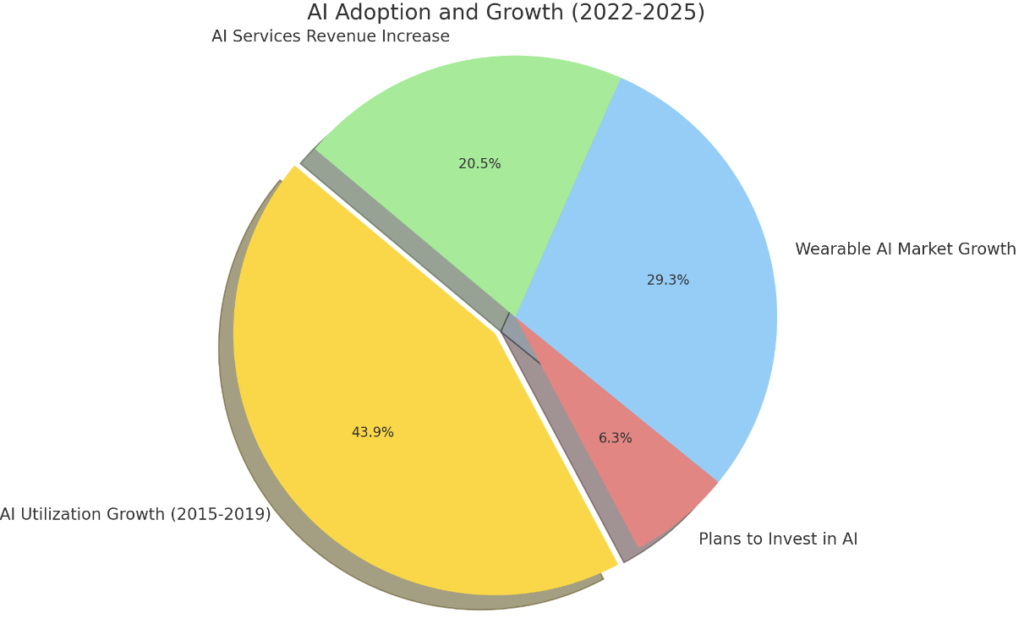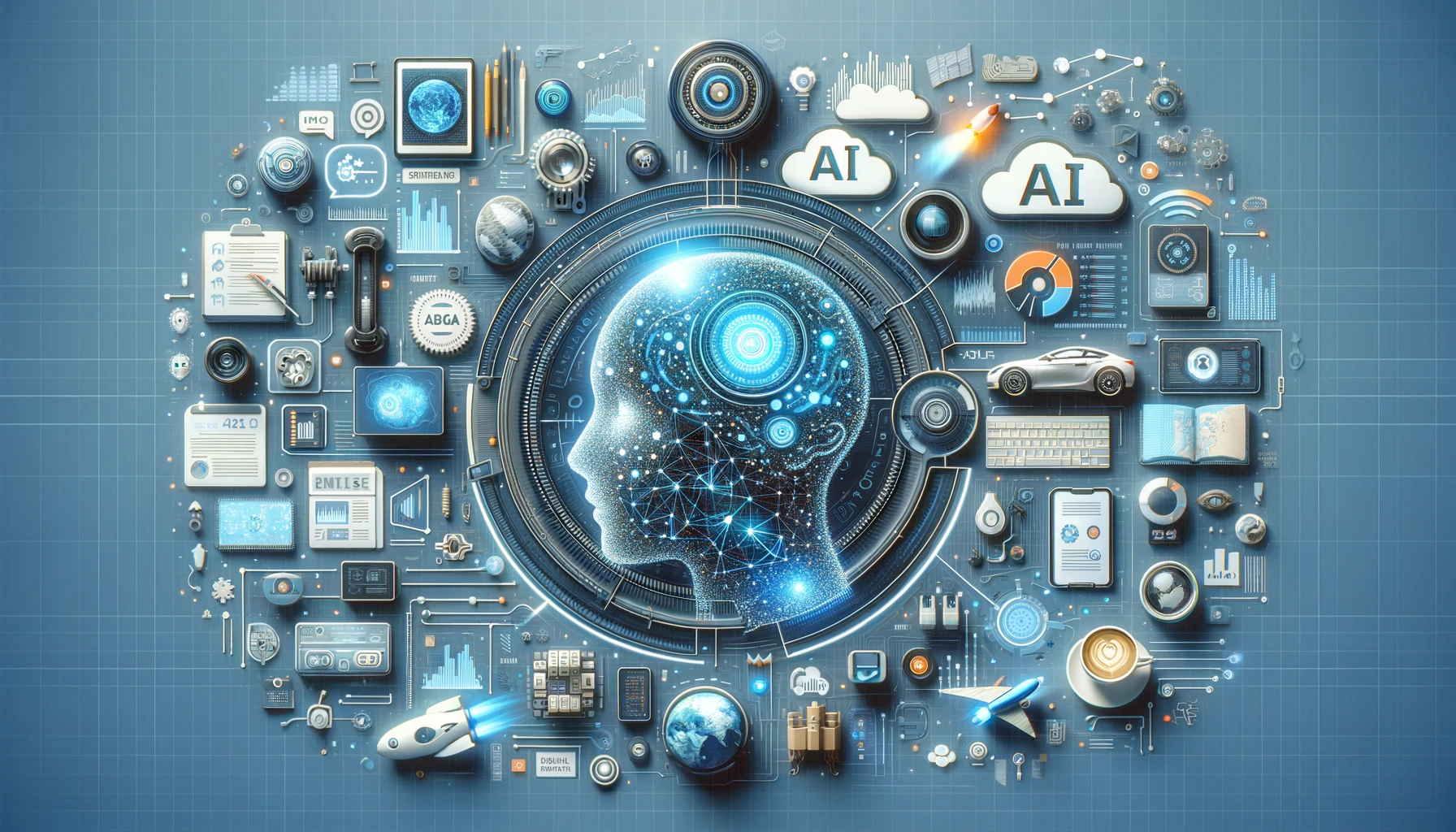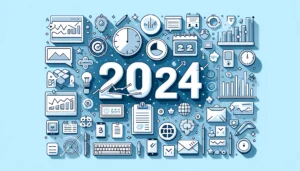Artificial Intelligence Statistics 2024: Explore the latest AI breakthroughs—from ChatGPT advancements to autonomous vehicle innovation. This concise overview offers a glimpse into AI’s market size, rapid growth, and its significant influence across industries.
Table of Contents
AI Industry Overview
The artificial intelligence (AI) industry has experienced remarkable growth, with the global market valued at approximately $196 billion. This growth is not just a testament to AI’s increasing integration into various sectors but also points to a future where its influence expands exponentially. By 2030, forecasts suggest the AI market could surpass $1.81 trillion, propelled by a compound annual growth rate (CAGR) of 38.1%. This expansion reflects the broadening applications of AI, from enhancing business operations to driving innovations in autonomous vehicles and beyond.

Adoption and Growth of AI
The adoption of artificial intelligence (AI) by businesses marks a significant leap towards digital transformation, with a staggering 270% growth in AI service utilization reported between 2015 and 2019. Initially, a mere 10% of organizations were exploring or implementing AI technologies. By 2019, this figure had surged to 37%, underscoring a rapidly growing confidence and investment in AI capabilities across various sectors.
In this era of technological advancement, approximately 39% of large companies are poised to invest in AI, recognizing its potential to revolutionize business processes, enhance customer experiences, and drive innovation. This investment is part of a broader trend, with the global AI adoption rate by organizations projected to expand at a CAGR of 38.1% from 2022 to 2030.
The financial implications are equally impressive. The AI services market, which generated about $19.4 billion in revenue in 2020, is estimated to have grown to $62.5 billion in 2022. By 2025, this figure is expected to reach a remarkable $126 billion, reflecting the increasing reliance on and integration of AI technologies in business operations.
Moreover, the wearable AI market, bolstered by the popularity of devices like the Apple Watch and Fitbits, is another domain experiencing significant growth. Predictions indicate that by 2025, the wearable AI market will be valued at $180 billion, further demonstrating the wide-reaching impact of AI across different aspects of consumer life and business operations.
These statistics not only highlight the rapid adoption and growth of AI technologies but also underscore the transformative potential of AI in reshaping business landscapes, driving efficiencies, and fostering new ways of engaging with customers. As businesses continue to navigate the possibilities offered by AI, the trajectory of AI’s growth and adoption seems set on an upward path, promising a future where AI is an integral part of business strategy and operational excellence.

Source: Explodingtopics, Techopedia.
AI Applications Across Industries
The impact of artificial intelligence (AI) extends far beyond the confines of technology firms, seeping into various sectors and fundamentally altering how businesses interact with their customers. AI’s role in marketing, customer service, and sales highlights its pivotal position in modern business strategies, driving efficiency and personalization to unprecedented levels.
AI in Marketing
AI-driven algorithms have transformed marketing by enabling hyper-personalized customer experiences. Tools like automated content creation, predictive analytics, and targeted advertising allow businesses to engage customers more effectively, increasing conversion rates and fostering loyalty. AI’s capability to sift through vast datasets enables marketers to identify and act on emerging trends swiftly, ensuring that their strategies remain relevant and impactful.
AI in Customer Service
In the realm of customer service, AI has introduced a new era of convenience and efficiency. Chatbots and virtual assistants, powered by sophisticated machine learning models, provide 24/7 support, handling inquiries and resolving issues at speeds no human team could match. This not only enhances customer satisfaction but also allows businesses to allocate human resources to more complex tasks, optimizing overall productivity.
AI in Sales
Sales departments leverage AI to fine-tune their processes, from lead generation to closing deals. AI tools analyze customer data to predict buying behavior, identify high-quality leads, and recommend personalized sales strategies. This not only streamlines the sales process but also significantly increases the chances of successful conversions. Moreover, AI’s role in sales forecasting provides valuable insights, helping businesses make informed decisions and adjust their strategies in real time.
Employment and AI
While AI’s ascendancy brings myriad benefits, it also stirs concerns about job displacement. As AI takes over repetitive tasks, the nature of many jobs will inevitably change. However, this shift also opens up opportunities for new roles focused on managing and enhancing AI systems. The net effect of AI on employment will largely depend on how businesses and workers adapt to these changes, emphasizing the need for skills development and education in AI-related fields.
Where AI Stands Today
Today, AI is omnipresent, from smartphones and home assistants to healthcare and financial services. Its applications range from enhancing user experiences with personalized recommendations to improving public safety through predictive policing. As AI technology continues to evolve, its integration into daily life and business operations will only deepen, heralding a future where AI’s influence is all-encompassing.
The statistics and trends underscore AI’s transformative potential across industries. As businesses continue to harness AI’s power, the technology’s role in driving innovation, efficiency, and competitiveness will become increasingly central, shaping the future of the global economy.
| Sector | Impact of AI |
|---|---|
| Marketing | Hyper-personalized experiences through automated content creation, predictive analytics, and targeted advertising. AI enables swift identification and action on trends, increasing engagement and loyalty. |
| Customer Service | Chatbots and virtual assistants provide 24/7 support, handling inquiries and resolving issues quickly, enhancing customer satisfaction and operational efficiency. |
| Sales | AI tools predict buying behaviors, identify quality leads, recommend personalized strategies, and aid in sales forecasting, increasing conversion rates and informing strategic decisions. |
| Employment | AI introduces job displacement concerns but also creates opportunities for new roles in managing AI systems, emphasizing the need for skill development in AI-related fields. |
| Current Applications | AI is pervasive, enhancing user experiences with personalized recommendations, improving healthcare, financial services, and more, indicating a future where AI’s influence is ubiquitous. |
The Future of AI
AI Challenges & Predictions
As we navigate through the dawn of artificial intelligence (AI) integration into every facet of our lives and industries, it’s crucial to address the challenges and make informed predictions about the future of this transformative technology.
Navigating Ethical and Practical Challenges
The advancement of AI brings forth a spectrum of ethical and practical challenges. Among these, job displacement looms large, with AI’s capability to automate tasks previously performed by humans sparking fears of widespread unemployment. However, this technological evolution also paves the way for the creation of new job categories, demanding a shift in the workforce’s skill set toward more AI-centric roles.
Transparency in AI algorithms and the potential for biases in machine learning models pose significant ethical concerns. Ensuring fairness and accountability in AI’s decision-making processes is paramount for its ethical application across industries. Moreover, the cost of implementing advanced AI technologies remains a barrier for many businesses, necessitating solutions that democratize access to AI tools.
The Future of AI: Integration, Innovation, and Impact
Looking ahead, AI is set to become even more integrated into our daily lives and the backbone of business innovation. Predictions for the future of AI include:
- Widespread Adoption Across Industries: From healthcare to finance and beyond, AI’s role in enhancing efficiency, personalizing experiences, and driving innovation will become more pronounced.
- Advancements in AI Capabilities: Continued research and development are expected to overcome current limitations, making AI more adaptable, reliable, and capable of performing complex tasks.
- Economic Impact: AI has the potential to significantly boost global GDP, with estimates suggesting it could add trillions to the world economy by enhancing productivity and creating new markets.
- AI in Everyday Life: The use of AI in personal assistants, smart home devices, and wearable technology will become more sophisticated, making technology more intuitive and integrated into our daily routines.
- Ethical AI Frameworks: As awareness of AI’s ethical implications grows, the development of comprehensive frameworks to govern AI use is likely. These will aim to ensure AI’s benefits are distributed equitably while minimizing its risks.
The journey of AI from a niche technological innovation to a cornerstone of future societies and economies is fraught with challenges. Yet, the opportunities it presents for enhancing human capabilities, driving economic growth, and solving complex problems are unparalleled. As we look to the future, the focus must remain on harnessing AI’s potential responsibly and ethically, ensuring it serves the betterment of society as a whole.
Conclusion
In conclusion, the journey through artificial intelligence’s current landscape and its future trajectory reveals a technology brimming with potential to revolutionize industries, enhance human productivity, and address complex societal challenges. As we stand on the brink of widespread AI adoption, it is imperative to navigate the ethical and practical challenges with foresight and responsibility. Embracing AI’s transformative power while ensuring equitable benefits and minimizing risks will be key to unlocking a future where technology and humanity advance in tandem. The dialogue surrounding AI must continue to evolve, guided by insights, innovations, and a commitment to shaping a world where AI acts as a force for positive change.
For more related content, check out: Emails Marketing Latest Trends, Emails Marketing Effectiveness and Quillbot Statistics.





